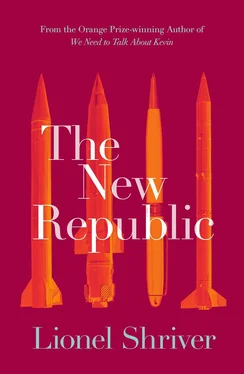This novel is entirely a work of fiction. The names, characters and incidents portrayed in it are the work of the author’s imagination. Any resemblance to actual persons, living or dead, events or localities is entirely coincidental.
The Borough Press
An imprint of HarperCollins Publishers
1 London Bridge Street
London SE1 9GF
www.harpercollins.co.uk
First published in Great Britain by Harper CollinsPublishers 2012
Copyright © Lionel Shriver 2012
Lionel Shriver asserts the moral right to be identified as the author of this work
A catalogue record for this book is available from the British Library
Source ISBN: 9780007459919
Ebook Edition © June 2012 ISBN: 9780007459926
Version: 2017-05-04
All rights reserved under International and Pan-American Copyright Conventions. By payment of the required fees, you have been granted the non-exclusive, non-transferable right to access and read the text of this e-book on-screen. No part of this text may be reproduced, transmitted, down-loaded, decompiled, reverse engineered, or stored in or introduced into any information storage and retrieval system, in any form or by any means, whether electronic or mechanical, now known or hereinafter invented, without the express written permission of HarperCollins e-books
To Sarowitz, of course—
a solo dedication being long overdue
My experiences with journalists authorize me to record that a very large number of them are ignorant, lazy, opinionated, intellectually dishonest, and inadequately supervised … They have huge power, and many of them are extremely reckless.
— CONRAD BLACK
Political language … is designed to make lies sound truthful and murder respectable, and to give an appearance of solidity to pure wind.
— GEORGE ORWELL

CONTENTS
Title Page
Copyright
Dedication
Epigraph
Map
1. Honorable Mention
2. Saddling Up
3. Long Time, No See
4. Inversion 101
5. Security Theater
6. Only Edgar
7. Edgar Meets His New Little Friends
8. Ninety-Nine Push-Ups and Cloudberry Shampoo
9. G;p[[u Mpmdrmdr
10. The Empty Wingchair
11. The Celery Wars
12. Edgar Meets Baby Serious and Debuts at the Barking Rat
13. A Brief Apprenticeship as an Ignorant Dipshit
14. No Trace Found of Reporter in Terrorist Stronghold
15. Any Slob Can Buy Shit
16. A Whiff of the Old Bastard Himself
17. Playing Hard to Get with a British Accent
18. Couscous and Balaclava
19. Saab Stories
20. Edgar Earns His Savvy
21. One Less Ugly Landmark
22. Taken for SAPSS
23. Impostor Syndrome
24. Barba Is No Longer Boring
25. Portugal Denies Immigration Overhaul Is SOB Appeasement
26. Every Former Fat Boy’s Dream
27. Friend of the Fucking Family
28. Barrington Has Feelings
29. Stealing Shit from Shitheads
30. Supporting the Peace Process
31. The Tooth Fairy Gives an Interview
32. Renowned International Terrorist Brakes for Pussycat
33. Little Jack Coroner Sits on a Foreigner
34. The Tooth Fairy Leaves Behind a Bigger Surprise than a Quarter
35. Bubbardizing Humberto
36. Barringtonizing the Barking Rat
37. The Curse of Interesting Times
38. Inversion
Altavista Epilogue
Author’s Note
Acknowledgments
About the Author
Praise for The New Republic
Also by Lionel Shriver
About the Publisher
chapter 1
Honorable Mention
Whisking into his apartment house on West Eighty-Ninth Street, Edgar Kellogg skulked, eager to avoid eye contact with a doorman who at least got a regular paycheck. His steps were quick and tight, his shoulders rounded. Unable to cover next month’s rent, he peered anxiously at the elevator indication light stuck on twelve, as if any moment he might be arrested. Maxing out the credit cards came next. This place used to give him such a kick. Now that he couldn’t afford it, the kick was in the teeth, and tapping cordovans literally down at the heel, he calculated morosely that for every day in this fatuous dive he was out ninety bucks. Waiting on a $175 check from the Amoco Traveler was like trying to bail out a rowboat with an eyedropper while the cold, briny deep gushed through a hole the size of a rubber boot.
Up on the nineteenth floor, Edgar shot a look around at what, underneath it all, was a plushly appointed one-bedroom, but the management’s cleaning service had been one of the first luxuries to go. At only ten a.m., Edgar found himself already eyeing the Doritos on the counter. One thing he hadn’t anticipated about the “home office” was Snack Syndrome; lately his mental energies divided evenly between his new calling (worrying about money, which substituted neatly for earning it) and not stuffing his face. God, he was turning into a girl, and in no time would find himself helplessly contriving sassy Ryvita open-faces with cherry tomatoes (only twenty-five calories!). The thought came at him with a thud: This isn’t working out . Quick on its heels, I’ve made a terrible mistake . And, since Edgar was never one to put too fine a point on it, I’m an ass.
This was not the positive thinking that the how-tos commended in the run-up to a job interview, in preparation for which Edgar cleared off the beer cans and spread out the National Record . Hours in advance, his concentration was already shaky. Picking out single words in strobe, his eyes skittered across an article about terrorism: these days it was news that there wasn’t any. Further down: some correspondent had gone missing three months ago. The gist: he was still missing. If it weren’t a reporter who’d vanished, this “story” would never have run, much less on the front page. After all, if Edgar Kellogg disappeared tomorrow, the Record was unlikely to run frantic updates on the ongoing search for a prematurely retired attorney turned nobody freelancer. In the argot of his new trade, “freelance” was apparently insider jargon for “unemployed,” and when he mumbled the word to acquaintances they smirked.
Yet instead of getting up to speed on current events, Edgar found himself once again compulsively scanning for a Tobias Falconer byline. Funny thing was, when he found one, he wouldn’t read the article. And this was typical. For years he’d snagged this oppressively earnest, tiny-print newspaper—one of the last austere holdouts that refused to go color—solely to locate Falconer’s pieces, but he could seldom submit to reading them. Edgar had never tried to identify what he feared.
Collapsing into the deep corduroy sofa, Edgar surrendered to the free-floating reflection that ten frenzied years on Wall Street had so mercifully forestalled. For all that time, Toby Falconer’s supercharged byline had given Edgar a jolt, its alternating current of envy and wistfulness confusing but addictive. These little zaps made his scalp tingle, but reading whole features would be like sticking his fingers into a light socket. In that event, why buy the paper at all? Why monitor the career of a man whom Edgar hadn’t seen in twenty years, and of a traitor to boot, whose very surname made him wince?
Читать дальше













